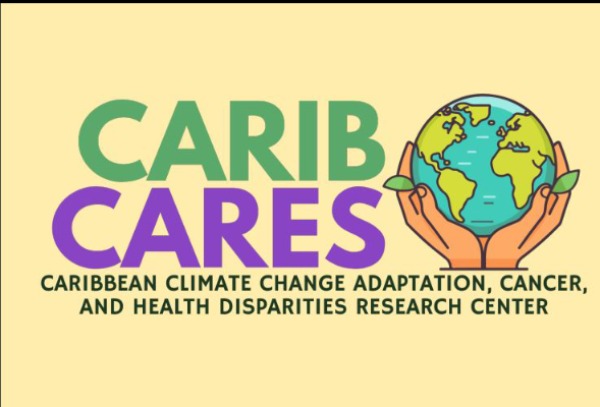
The University of the Virgin Islands (UVI), the University of Puerto Rico Comprehensive Cancer Center (UPRCCC), and the University of Puerto Rico Medical Sciences Campus (UPRMSC) announced the launch of the Caribbean Climate Change Adaptation, Cancer, and Health Disparities Research Center (CARIB-CARES), on Tuesday at UVI’s LaVerne Ragster Administration and Conference Center Building. This new research and training center is dedicated to addressing critical issues affecting the Caribbean region and will focus exclusively on research related to climate change, the cancer continuum, and health disparities.
Supported by the United States National Cancer Institute (NCI) within the National Institutes of Health (NIH), CARIB-CARES will receive an allocation of $3.43 million over a three-year period. Its mission is to tackle the impact of climate change on cancer prevention and control, as well as related health disparities in Puerto Rico and the United States Virgin Islands.
“This partnership between leading institutions of research demonstrates our deep commitment to fostering research and innovation that uplift our communities and drive solutions for a healthier, more resilient future,” emphasized UVI President Dr. Safiya George. She further stated, “This initiative addresses two of the most pressing challenges of our time - climate change and cancer disparities in the U.S. Caribbean. It represents a significant step forward in our commitment to addressing the health challenges faced by our communities.”
The launch of CARIB-CARES coincides with the seventh anniversary of Hurricane Maria, underscoring its relevance to the region. Since the hurricane's impact, UVI and UPR have been at the forefront of research on how climate phenomena affect treatment strategies and the quality of life of cancer patients.
“Through this collaboration, we will conduct research that we hope will help to sustain resilient and healthy island communities and identify cancer threats synergized by climate change pressures in this region,” said Dr. Noreen Michael, UVI Caribbean Exploratory Research Center director and CARIB-CARES principal investigator.
Dr. Ana Patricia Ortiz, director of CARIB-CARES, lead investigator at the UPRCCC and principal investigator, remarked, “CARIB-CARES will allow us to expand the research we are conducting to increase our understanding of the impact of climate change and its stressors on the cancer control continuum in the Caribbean region, including cancer risk, prevention, detection, diagnosis, treatment and survivorship.”
The new center will foster collaborations with the Graduate School of Public Health at the Medical Sciences Campus, UVI, and other institutions such as the University of South Florida and the American Cancer Society. This multi-institutional effort aims to create educational and training activities that benefit affected communities.
Dr. Pablo Méndez-Lázaro, UPR associate professor at the Medical Sciences Campus and principal investigator, noted, “Island territories like Puerto Rico and the U.S. Virgin Islands are extremely vulnerable to multiple climate stressors. Access to information about the impact of environmental stressors tied to climate change will help us make better decisions.”
CARIB-CARES will also include a community component that offers training on climate change adaptation, with a focus on cancer prevention and control. Drs. Nancy Cardona and Marievelisse Soto-Salgado will lead a research project addressing issues related to climate stressors and environmental pollution in vulnerable communities.
Dr. Humberto M. Guiot, interim executive director of Comprehensive Cancer Center for the University of Puerto Rico (CCCUPR), stated, “It is a great honor to collaborate with UVI on the creation of CARIB-CARES, given the importance of climate change in public health.”
Extreme weather events have disrupted cancer prevention and screening programs, resulting in delays in diagnosis and treatment. According to Dr. Ortiz, “Hurricanes Irma and Maria impacted cancer prevention and control efforts in Puerto Rico, as evidenced by our research studies.”
Through CARIB-CARES, UVI and UPR aim not only to increase research capacity but also to improve the quality of life of cancer patients in the region by addressing the challenges presented by climate change.